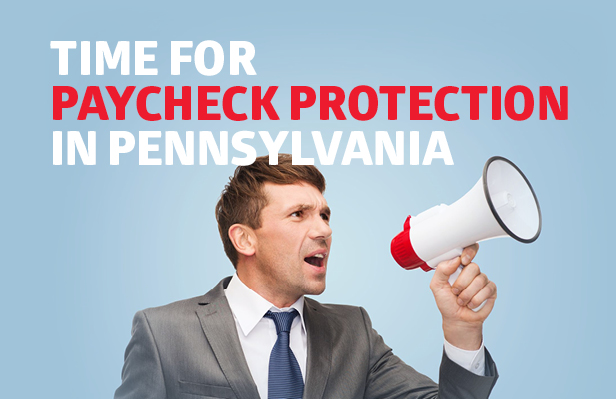Media

Top 5 Reasons We Need a Paycheck Protection Law
Occasionally I get asked why we need a state law preventing taxpayer resources from being used to collect union political money (“paycheck protection“), when local government can choose to not negotiate it into union contracts. “Shouldn’t it be resolved locally?” people ask.
Here are five reasons why the issue needs to be addressed at the state level, rather than at each of Pennsylvania’s 4,897 distinct local governments, many of whom have multiple labor contracts with different unions.
1) Taxpayer resources should never be used for partisan politics.
The vast majority of voters—even the vast majority of union households—believe it is wrong to use public resources to collect union dues and campaign contributions. Regardless of whether contracts are negotiated locally, public resources should never be used for political purposes. Union contracts should not be able to mandate a practice that ought to be illegal and is in many other states.
2) Collection of political money creates a conflict of interest and the possibility for corruption in the negotiation process.
Elected officials negotiate with local unions to collect dues—which can be used for lobbying and political activity—and Political Action Committee (PAC) contributions via public payroll systems. This creates the potential for corruption, or at least the appearance of corruption, as union executives turn around and make campaign contributions to the very officials they negotiated with. The largest government union PACs in Pennsylvania contributed $4 million directly to candidates during the 2011-12 elections.
For example, state AFSCME members have their dues and campaign contributions automatically withheld from their paychecks. State Treasurer Rob McCord—who is running for governor and is endorsed by AFSCME—collects, bundles and sends AFSCME’s money it to the union. The union, in turn, not only sends campaign contributions to “McCord for Governor,” but it can spend dues money on Rob McCord’s behalf through Super PACs. McCord, if elected Governor in November 2014, will then negotiate salaries, benefits, and other perks with AFSCME in June 2015, on the taxpayers’ behalf. This is what we call the “political power cycle.”
3) Local government officials are even asking for paycheck protection to avoid this conflict of interest.
At least 8 counties have passed resolutions endorsing paycheck protection legislation. As Christian Leinbach, a county Commissioner in Berks County and Chairman of the Board of the County Commissioners Association of Pennsylvania (CCAP) notes:
As county commissioner, I’m involved in negotiating with government unions when contracts expire. If these unions chose to support my campaign, I would essentially be negotiating the use of county resources to collect money that would then be given right back to me.
4) Unions have enormous leverage in negotiations, i.e., the power to strike.
Government unions—except for public safety—may go on strike to ensure that automatic deduction and collection of their dues and campaign money is included in labor contracts. This gives them immense power over local and state officials—the power to shut down schools and local services.
Here’s another example of the inordinate power given to AFSCME. AFSCME represents the lion’s share of state workers. AFSCME’s contract with the state requires the government to collect both political membership dues and PAC money from worker’s paychecks. If state officials refuse to agree to these terms, AFSCME could go on strike. That is, AFSCME could effectively shut down state government to force taxpayers to collect their campaign contributions.
5) Arbitration rulings can overturn collective bargaining negotiations and force dues collection back into contracts, even when local officials don’t want it included.
Top 5 Reasons We Need a Paycheck Protection Law printable PDF handout.